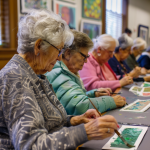In today’s rapidly evolving world, the thirst for knowledge and personal development continues well beyond formal schooling years. Lifelong learning, especially for seniors, is not only crucial for keeping up with societal changes but also for enhancing quality of life. This article delves into various learning opportunities for seniors, highlighting the benefits and popular options available.
The Importance of Lifelong Learning for Seniors
As the population ages, the concept of lifelong learning gains more relevance. Lifelong learning contributes significantly to the mental, emotional, and social well-being of older adults. Here are some key benefits:
- Cognitive Health: Engaging in educational activities helps maintain cognitive functions and can delay the onset of dementia-related illnesses.
- Social Interaction: Learning environments offer opportunities for seniors to meet new people, thereby combating social isolation.
- Personal Fulfillment: Pursuing new skills and knowledge fosters a sense of purpose and personal achievement.
Popular Lifelong Learning Opportunities for Seniors
Numerous educational opportunities are tailored to meet the unique needs of seniors, ranging from formal programs to casual classes.
Community Colleges and Universities
Many educational institutions offer programs specifically designed for older adults. These can range from auditing classes to more formal learning experiences.
- Auditing College Classes: Seniors can audit classes, attending them without receiving academic credit. This allows them to learn without the pressure of exams and grades.
- Continuing Education Programs: These programs offer short courses and workshops that cover a wide range of interests, from art and history to technology.
Online Learning Platforms
The internet has revolutionized access to education, making it possible to learn from the comfort of one’s home.
- MOOCs (Massive Open Online Courses): Platforms like Coursera, edX, and Khan Academy offer free or affordable courses on a wide variety of subjects.
- Virtual Classrooms: Applications like Zoom and Google Classroom have enabled interactive learning experiences without geographical limitations.
Local Community Centers
Local community centers often provide classes and workshops tailored to seniors. These can be valuable for those who prefer face-to-face interaction over digital learning.
- Exercise and Health Classes: From yoga to nutrition, classes aimed at promoting physical and mental health are popular.
- Hobby Groups: Seniors can explore or develop new hobbies like painting, gardening, or playing musical instruments in a social setting.
Volunteering and Mentorship Programs
Engaging with the community through volunteering or mentorship can also be a form of learning, as it involves new experiences and skills development.
- Volunteering: Many organizations offer volunteer opportunities that allow seniors to learn while giving back to their communities.
- Mentorship: Sharing knowledge and experience with younger generations can be incredibly rewarding and enlightening.
Overcoming Barriers to Lifelong Learning
Despite the many benefits, seniors may face barriers to embracing lifelong learning. Addressing these can facilitate broader participation.
- Accessibility: Ensure that educational venues are physically accessible. Online platforms should be easy to use and navigate.
- Affordability: Many seniors live on fixed incomes. Offering free or low-cost classes can make lifelong learning more accessible.
- Awareness: Often, seniors are unaware of available opportunities. Community outreach and clear communication can bridge this gap.
Conclusion
In conclusion, lifelong learning for seniors is a gateway to maintaining mental acuity, fostering social connections, and achieving personal fulfillment. By exploring the diverse range of educational opportunities available, seniors can continue to grow and thrive in their golden years.



